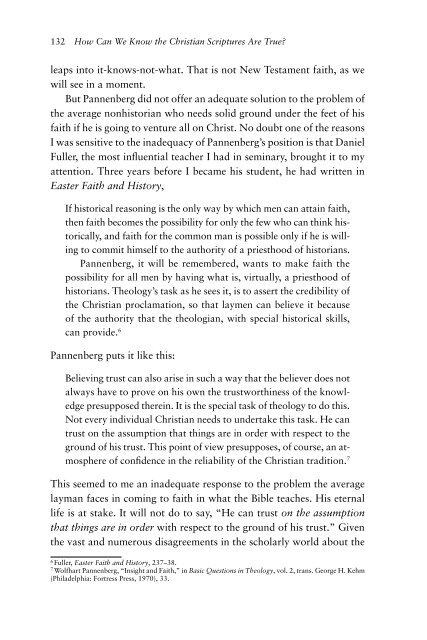Scriptures selfattesting authority question doctrine truthfulness Scriptures
peculiar-glory-en
peculiar-glory-en
Create successful ePaper yourself
Turn your PDF publications into a flip-book with our unique Google optimized e-Paper software.
132 How Can We Know the Christian <strong>Scriptures</strong> Are True?<br />
leaps into it-knows-not-what. That is not New Testament faith, as we<br />
will see in a moment.<br />
But Pannenberg did not offer an adequate solution to the problem of<br />
the average nonhistorian who needs solid ground under the feet of his<br />
faith if he is going to venture all on Christ. No doubt one of the reasons<br />
I was sensitive to the inadequacy of Pannenberg’s position is that Daniel<br />
Fuller, the most influential teacher I had in seminary, brought it to my<br />
attention. Three years before I became his student, he had written in<br />
Easter Faith and History,<br />
If historical reasoning is the only way by which men can attain faith,<br />
then faith becomes the possibility for only the few who can think historically,<br />
and faith for the common man is possible only if he is willing<br />
to commit himself to the <strong>authority</strong> of a priesthood of historians.<br />
Pannenberg, it will be remembered, wants to make faith the<br />
possibility for all men by having what is, virtually, a priesthood of<br />
historians. Theology’s task as he sees it, is to assert the credibility of<br />
the Christian proclamation, so that laymen can believe it because<br />
of the <strong>authority</strong> that the theologian, with special historical skills,<br />
can provide. 6<br />
Pannenberg puts it like this:<br />
Believing trust can also arise in such a way that the believer does not<br />
always have to prove on his own the trustworthiness of the knowledge<br />
presupposed therein. It is the special task of theology to do this.<br />
Not every individual Christian needs to undertake this task. He can<br />
trust on the assumption that things are in order with respect to the<br />
ground of his trust. This point of view presupposes, of course, an atmosphere<br />
of confidence in the reliability of the Christian tradition. 7<br />
This seemed to me an inadequate response to the problem the average<br />
layman faces in coming to faith in what the Bible teaches. His eternal<br />
life is at stake. It will not do to say, “He can trust on the assumption<br />
that things are in order with respect to the ground of his trust.” Given<br />
the vast and numerous disagreements in the scholarly world about the<br />
6<br />
Fuller, Easter Faith and History, 237–38.<br />
7<br />
Wolfhart Pannenberg, “Insight and Faith,” in Basic Questions in Theology, vol. 2, trans. George H. Kehm<br />
(Philadelphia: Fortress Press, 1970), 33.


